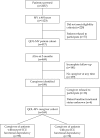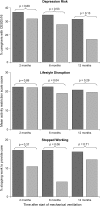Informal caregiver burden among survivors of prolonged mechanical ventilation
- PMID: 17068327
- PMCID: PMC1899280
- DOI: 10.1164/rccm.200604-493OC
Informal caregiver burden among survivors of prolonged mechanical ventilation
Abstract
Rationale: Although caregiver burden is well described in chronic illness, few studies have examined burden among caregivers of survivors of critical illness. In existing studies, it is unclear whether the observed burden is a consequence of critical illness or of preexisting patient illness.
Objectives: To describe 1-yr longitudinal outcomes for caregivers of patients who survived critical illness, and to compare depression risk between caregivers of patients with and without pre-intensive care unit (ICU) functional dependency.
Methods: Prospective, parallel, cohort study of survivors of prolonged (greater than 48 h) mechanical ventilation and their informal caregivers. Caregivers were divided into two cohorts on the basis of whether patients were functionally independent (n = 99, 59%), or dependent (n = 70, 41%) before admission. Functional dependency was defined as dependency in one or more activities of daily living or in three or more instrumental activities of daily living. Patient and caregiver outcomes were measured 2, 6, and 12 mo after mechanical ventilation initiation.
Measurements and main results: We studied three caregiver outcomes: depression risk, lifestyle disruption, and employment reduction. Most patients were male (59.8%), with a mean (SD) age of 56.6 (19.0) yr. Caregivers were mostly female (75.7%), with a mean (SD) age of 54.6 (14.7) yr. Prevalence of caregiver depression risk was high at all time points (33.9, 30.8, and 22.8%; p = 0.83) and did not vary by patient pre-ICU functional status. Lifestyle disruption and employment reduction were also common and persistent.
Conclusions: Depression symptoms, lifestyle disruption, and employment reduction were common among informal caregivers of critical illness survivors. Depression risk was high regardless of patient pre-ICU functional status.
Figures


Similar articles
-
Patient-specific, time-varying predictors of post-ICU informal caregiver burden: the caregiver outcomes after ICU discharge project.Chest. 2010 Jan;137(1):88-94. doi: 10.1378/chest.09-0795. Epub 2009 Sep 17. Chest. 2010. PMID: 19762552 Free PMC article.
-
Prevalence and outcomes of caregiving after prolonged (> or =48 hours) mechanical ventilation in the ICU.Chest. 2004 Feb;125(2):597-606. doi: 10.1378/chest.125.2.597. Chest. 2004. PMID: 14769744
-
Long-term mortality and quality of life after prolonged mechanical ventilation.Crit Care Med. 2004 Jan;32(1):61-9. doi: 10.1097/01.CCM.0000098029.65347.F9. Crit Care Med. 2004. PMID: 14707560
-
Reported burden on informal caregivers of ICU survivors: a literature review.Crit Care. 2016 Jan 21;20:16. doi: 10.1186/s13054-016-1185-9. Crit Care. 2016. PMID: 26792081 Free PMC article. Review.
-
Return to Employment after Critical Illness and Its Association with Psychosocial Outcomes. A Systematic Review and Meta-Analysis.Ann Am Thorac Soc. 2019 Oct;16(10):1304-1311. doi: 10.1513/AnnalsATS.201903-248OC. Ann Am Thorac Soc. 2019. PMID: 31184500
Cited by
-
Post-Intensive Care Syndrome as a Burden for Patients and Their Caregivers: A Narrative Review.J Clin Med. 2024 Oct 2;13(19):5881. doi: 10.3390/jcm13195881. J Clin Med. 2024. PMID: 39407940 Free PMC article. Review.
-
Long-term outcomes from sepsis.Curr Infect Dis Rep. 2007 Sep;9(5):382-6. doi: 10.1007/s11908-007-0059-3. Curr Infect Dis Rep. 2007. PMID: 17880848
-
Mobile, awake and critically ill.CMAJ. 2008 Mar 11;178(6):725-6. doi: 10.1503/cmaj.080178. CMAJ. 2008. PMID: 18332388 Free PMC article. No abstract available.
-
Expectations and outcomes of prolonged mechanical ventilation.Crit Care Med. 2009 Nov;37(11):2888-94; quiz 2904. doi: 10.1097/CCM.0b013e3181ab86ed. Crit Care Med. 2009. PMID: 19770733 Free PMC article.
-
Toward an integrated research agenda for critical illness in aging.Am J Respir Crit Care Med. 2010 Oct 15;182(8):995-1003. doi: 10.1164/rccm.200904-0630CP. Epub 2010 Jun 17. Am J Respir Crit Care Med. 2010. PMID: 20558632 Free PMC article.
References
-
- National Alliance for Caregiving; AARP. Caregiving in the United States. Available from: http://www.caregiving.org/data/04execsumm.pdf (accessed November 2006).
-
- Schulz R, Beach SR. Caregiving as a risk factor for mortality: the Caregiver Health Effects Study. JAMA 1999;282:2215–2219. - PubMed
-
- Schulz R, O'Brien AT, Bookwala J, Fleissner K. Psychiatric and physical morbidity effects of dementia caregiving: prevalence, correlates, and causes. Gerontologist 1995;35:771–791. - PubMed
-
- Covinsky KE, Goldman L, Cook EF, Oye R, Desbiens N, Reding D, Fulkerson W, Connors AF Jr, Lynn J, Phillips RS; SUPPORT Investigators. The impact of serious illness on patients' families: Study to Understand Prognoses and Preferences for Outcomes and Risks of Treatment. JAMA 1994;272:1839–1844. - PubMed
Publication types
MeSH terms
Grants and funding
LinkOut - more resources
Full Text Sources
Other Literature Sources
Medical

